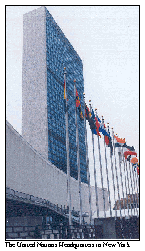UN Seminar on Islamophobia
 New
York: Addressing an audience which included a delegation headed
by the Muslim Public Affairs Council, UN Secretary General
Kofi Annan called for increased education, legal protection,
and interfaith dialogue to combat the rising tide of Islamophobia
during a seminar on "Confronting Islamophobia" held
at the United Nations.
New
York: Addressing an audience which included a delegation headed
by the Muslim Public Affairs Council, UN Secretary General
Kofi Annan called for increased education, legal protection,
and interfaith dialogue to combat the rising tide of Islamophobia
during a seminar on "Confronting Islamophobia" held
at the United Nations.
"Unlearning intolerance is in part a matter of legal
protection," Annan said to an audience of over 600 international
scholars, American Muslims, and interfaith leaders. "But
laws and norms are just a starting point... There is a need
to unlearn the habit of xenophobia."
The seminar, which focused on the current realities of Islamophobia
and the role of education and the media in countering damaging
stereotypes, represented a historic opportunity for American
Muslims to learn from and strategize with prominent participants
in the ongoing international dialogue on Islam and Muslims.
To contribute to this important task, MPAC's delegation met
with representatives from the United Nations, its Member States
and affiliated non-governmental organizations, who emphasized
the need to transcend tolerance. The 20-member group of scholars,
professionals and community activists included MPAC's National
Director Ahmed Younis, Communications Director Edina Lekovic
and Washington, DC staffer Amin Alsarraf, as well as a representative
of the New York Chapter of the Council on American-Islamic
Relations (CAIR).
"The context of the on-going dialogue is tolerance, which
represents a minimal connection between two particles,"
said Dr. Ahmad Kamal Aboul Magd, who is Professor of Public
Law at Cairo University and Judge for the World Bank Administrative
Tribunal. "We are fully aware of the eminent dangers
that are continually crossing the boundaries of geography,
politics and populations in the effort of making life more
enjoyable for all people. Tolerance is very minimalist, negative,
and passive. The same goes for coexistence."
In a panel addressing the role of education, Professor Noah
Feldman, author of "After Jihad: America and the Struggle
for Islamic Democracy," characterized the pervasive nature
of anti-Islam sentiment as a challenge to be met with honesty
and objectivity.
 "Even spreading
a better understanding of Islam does not guarantee the end
of Islamophobia, but it can protect against a particularly
virulent response to misinformation," said Feldman, Associate
Professor of Law at New York University. "Here in the
United Nations, the principle that governs is that persons
who disagree can nonetheless find common ground to benefit
the greater good."
"Even spreading
a better understanding of Islam does not guarantee the end
of Islamophobia, but it can protect against a particularly
virulent response to misinformation," said Feldman, Associate
Professor of Law at New York University. "Here in the
United Nations, the principle that governs is that persons
who disagree can nonetheless find common ground to benefit
the greater good."
During the audience Q&A session which followed the panel,
National Director Ahmed Younis introduced the delegation as
a group of American Muslims who believe that there is no dissonance
between being an American and a Muslim. He asked Feldman how
he, in his capacity as a writer, educator and legal expert,
could bolster such mainstream moderate voices.
"Muslim Americans have an extraordinary challenge in
front of them – to go out to university campuses, to
television, to write in newspapers and write books and to
communicate their distinctive perspective. Be honest,"
Feldman responded. "Feel no need to be apologetic. When
you see that a version of Islam that you find attractive should
be pushed – say so. All I can do is tell you is that
I’m looking forward to a day that an American of Jewish
origin would not be called by the media to talk about Islam."
Giandomenico Picco, Special Adviser and Personal Representative
of the Secretary-General for the UN Dialogue among Civilizations,
articulated the source of phobias as a fear of change, which
is compounded by the media attention given to individuals
and groups with extreme views.
"It is time to take away from the hands of the extremists
the ability to dictate the agenda," Picco said. Dr. Aziza
Al-Hibri, University of Richmond law professor, and Amaney
Jamal, Assositant Professor of Politics at Princeton University,
also discussed the real consequences of extremism which undermines
the work of moderates to claim their identity and define their
religious and political beliefs independently.
"Too often, the diversity of Islam has been seen through
the lens of extremism," said Dr. John Esposito, founder
of the Center for Muslim-Christian Understanding at Georgetown
University. "It will not be eradicated easily or soon.
Therefore. we all have a critical role to play. Religious
and political leaders, educators, and media people, the private
and public sectors are charged today to promote interreligious
and intercultural dialogue that is grounded in mutual understanding
of others.
"The message is simple: Islam is not the enemy, religious
extremism is," added Esposito, who will be a keynote
speaker during MPAC's national convention on December 18.
Moderated by Shashi Tharoor, Undersecretary-General for Communications
and Public Information, the seminar was the second in a series
entitled "Unlearning Intolerance" which has previously
examined anti-Semitism.
-------------------------------------------------------------------------------------

